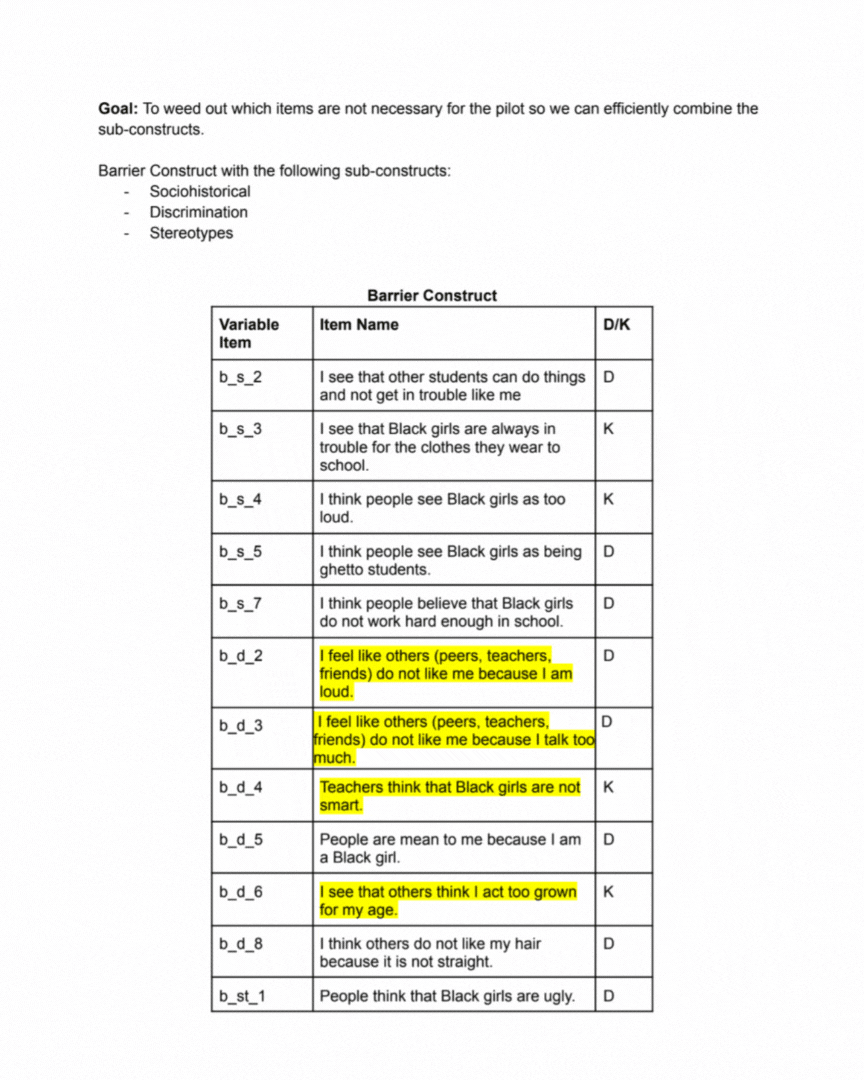MICMI – Measuring Identity Constructs in Mathematics for Black Girls
Client:Vanderbilt University
Project Type:Mixed-Methods Measure Development + Psychometric Validation
Industry Intersection:Education Equity + Math Identity + Mixed Methods Research
Overview
MICMI is a national research project that centers the experiences of Black girls in mathematics to redefine and measure math identity through a culturally specific lens. Fradely Delacruz, as Research Assistant and Project Manager, co-led project operations, instrument development, item revision, cognitive interview analysis, and data integrity strategy. The project employed a transformative mixed-methods design that integrated quantitative validation, psychometric modeling, and qualitative insights from 354 participants, ultimately positioning MICMI as a pioneering, equity-rooted measure of math identity.
Description
Fradely guided implementation logistics, oversaw data collection risk mitigation efforts, and led iterative item revisions informed by team reviews and youth-centered cognitive interviews. She contributed to developing rigorous protocols that embedded equity, trauma awareness, linguistic accessibility, and participatory principles into every research phase. Her infographics visually communicated key findings, fostering deeper understanding across interdisciplinary teams, stakeholders, and school districts.
Deliverables
Cognitive Interview Design: Developed a multi-stage protocol and bilingual consent process to ensure inclusive and ethical participation
Survey Item Refinement: Co-authored revisions for Barrier and Asset subconstructs using culturally grounded phrasing and youth feedback
Risk Mitigation Strategy: Implemented a school-based data collection risk plan with proactive communication systems and back-up protocols
Quantitative Analysis: Assisted in validation process using REDCap, SPSS, and EFA to test psychometric strength and item reliability
Infographic Development: Designed visual data summaries for youth panels, stakeholder engagement, and final reporting
Stakeholder Communication: Co-facilitated virtual panel discussions with educators, families, and district representatives to elevate engagement
Coding & Reliability Alignment: Ensured intercoder reliability (IRR) and culturally affirming coding logic across qualitative and quantitative data streams
Key Outcomes
Mixed-Methods Validation: Co-led analysis using REDCap data from 354 Black girls across the U.S.
Visual Data Storytelling: Designed infographics to communicate themes and findings to youth, families, and stakeholders.
Psychometric Strength: Refined items using IRT-informed modeling to ensure clarity, brevity, and construct integrity.
Culturally Grounded Constructs: Developed Asset and Barrier subconstructs rooted in lived experience, historical context, and identity.
Community Engagement: Co-hosted bilingual panels and improved recruitment strategies with school districts.
Validation Results: Established strong positive correlations (>.540) confirming MICMI's validity, while identifying mismatches with traditional measures like Cribbs and Piers-Harris.
Participatory Research: Embedded youth feedback loops, cognitive interview cycles, and accessibility reviews to inform survey revisions.



